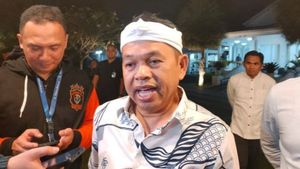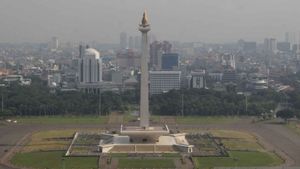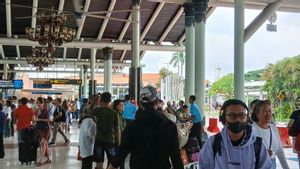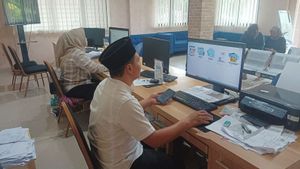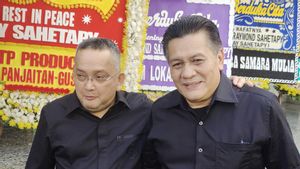JAKARTA - The Director for the Study of Materials for the Development of Pancasila Ideology at the Pancasila Ideology Development Agency (BPIP) Aris Heru Utomo said that propaganda or news containing false information in the digital world could weaken national unity and integrity.
"Currently, propaganda or the dissemination of information or false news to weaken the unity and integrity of the nation can be done digitally. Information enters public spaces through electronic devices held by people from young to adults," said Aris, quoted by Antara, Sunday, January 30.
The statement was delivered in a public lecture on Pancasila with the theme "Actualization of Pancasila Values as the Basic Character of the Young Generation in the Disruption Era of the Industrial Revolution 4.0 in Encouraging the Realization of National Cyber Security".
"This is where the importance of strengthening the understanding of Pancasila so that the very diverse Indonesian people are not easily influenced or tempted by values that are not in accordance with the personal values of the Indonesian nation itself," Aris added.
Therefore, according to Aris, it is important to understand Pancasila as a unifier of the various diversity that exists in the Indonesian nation. At the same time, as a dynamic "guiding star" (Leitstar) who becomes a reference for the life of the nation to be in accordance with the ideals of the founding of the state.
To the 98 cadets/I level one of the National Cyber and Password Polytechnic (formerly the National Cyber and Crypto School) who attended the Pancasila public lecture, Aris explained the reasons why the Indonesian people made Pancasila the basis of the state, the nation's view of life, and the state ideology.
"There are at least four underlying reasons why we must understand Pancasila, namely historical, philosophical, juridical, and sociological," said Aris.
Aris explained the four reasons, and departed from historical reasons by quoting the title of the speech of the first President of the Republic of Indonesia Sukarno on August 17, 1966 "Don't Ever Leave History!".
"We should never leave behind the long histories that the founders of the nation have fought for. Historically, Pancasila is the basis of the state, the nation's view of life, and the ideology of the state which was compiled by the founders of the Indonesian state through a long series of processes," said Aris.
The Indonesian nation has a history that is formed dialectically based on the values that have been embraced by this nation. In the life journey of the Indonesian people, the values contained in Pancasila as the distinctive values that grow in Indonesia have proven to have made the Indonesian nation in the NKRI container survive to this day, he said.
Based on philosophical reasons, Pancasila is not a religion, but are the five basic rules of life and livelihood of the Indonesian people, which after being dug deeply from the soul and life of the nation are formulated as a unified whole.
Pancasila contains values that are sourced from the synergy of inner experiences and the factual experiences of the Indonesian people in the life of society and nation. Aris then said that on the basis of Pancasila, the unity of Indonesia was implemented and the Republic of Indonesia was established.
Juridically, Pancasila as the ideology and basis of the state is formulated in the Preamble to the 1945 Constitution and various other laws and regulations, such as Law Number 12 of 2011 concerning the Establishment of Legislation and Presidential Decree Number 24 of 2016 concerning the Birthday of Pancasila.
Lastly, sociologically, Pancasila as the basis of the state and the ideology of the nation is a "static table" that unites the various diversity that exists in the Indonesian nation.
In the connection between Pancasila and national cyber security, Aris also said that the lack of understanding of the values of Pancasila has led to the threat of national unity and integrity.
"The destruction of national unity and integrity can have an impact on the weakness of the national cyber security system because its personnel are easily infiltrated and pitted against each other," said Aris.
The English, Chinese, Japanese, Arabic, and French versions are automatically generated by the AI. So there may still be inaccuracies in translating, please always see Indonesian as our main language. (system supported by DigitalSiber.id)




